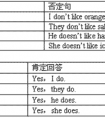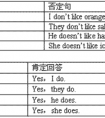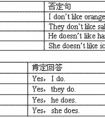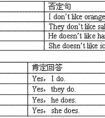按要求改写句子。1. The old man is taking a walk in the park. (改为否定句)________________________________________________________________________2. We are tal-六年级英语
题文
| 按要求改写句子。 |
| 1. The old man is taking a walk in the park. (改为否定句) ________________________________________________________________________ 2. We are talking about how to learn English well. (对画线部分提问) ________________________________________________________________________ 3. Mike is playing computer games. (对画线部分提问) ________________________________________________________________________ 4. Lily is looking for her pencil. (改为一般疑问句,并作否定回答) ________________________________________________________________________ ________________________________________________________________________ |
答案
| 1. The old man isn't taking a walk in the park. 2. What are you talking about? 3. Who is playing computer games? 4. Is Lily looking for her pencil? No, she isn't. (答案不唯一) |
据专家权威分析,试题“按要求改写句子。1. The old man is taking a walk in the park..”主要考查你对 疑问代词,否定句,一般疑问句 等考点的理解。关于这些考点的“档案”如下:
疑问代词否定句一般疑问句
考点名称:疑问代词
- 疑问代词:
在句子中用来构成特殊疑问句,主要用于询问“何人”、“何事”、“什么”。
常见的疑问代词如下表所示:
疑问代词
替代范围
who
人
whom
人
whose
人
which
人、事、物
what
事、物
考点名称:否定句
- 否定句:
表示否定的句子。必须有否定词。
否定句的构成形式:
a. 谓语为be动词时,“be+not "一名学生。
b. 谓语为实义动词而且没有情态动词和助动词时,“do/ does/ did+not"构成否定。
例:I do not like dancing. 我不喜欢跳舞。
He does not want to go to school. 他不想去上学。
c. 谓语为“情态动词+实义动词”时,“情态动词+not”构成否定。
例:You must not smoke. 你千万不要吸烟。
I can not catch it. 我抓不住它。 - 否定句在英语语法中可以分为九类:
(1)一般否定句
I don't know this. No news is good news.
There is no person(smoking)/not a person/not any person(smoking)in the house.
(2)特指否定
He went to his office, not to see him.
I am sorry for not coming on time.
I don't think/believe/suppose/feel/imagine you are right.
(3)部分否定
All the answers are not right
All is not gold that glitters
I don't know all of them.
I can't see everybody/everything.
Both of them are not right.
(4)全体否定
None of my friends smoke.
I can see nothing/nobody.
Neither of them is right.
Nothing can be so simple as this.
(5)延续否定
You didn't see him, neither/nor did I.
You don't know, I don't know either.
He doesn't know English, let alone/to say nothing of/not to speak of(更不用说)French.
(6)半否定句
We seldom/hardly/scarcely/barely hear such fine singing.
I know little English. I saw few people.
(7)双重否定
You can't make something out of nothing.
What's done cannot be undone.
There is no sweet without sweat.
No gain without pains.
I can't help /keep/ laughing whenever I hear it.
No man is so old but(that)he can learn.
(8)排除否定
Everyone is ready except you.
He did nothing but play.
But for your help, I couldn't do it.
(9)加强否定
I won't do it at all.
I can't see it any more.
He is no longer a boy. 否定转移的形式与用法:
一、动词的否定转移
1.形式上否定主句的谓语,实际上是否定从句的谓语
当动词“think”、“believe”、“suppose”、“imagine”、“expect”、“feel”的主语是第一人称,谓语动词为没有任何副词修饰的一般现在时,它们的否定式实际上是对宾语从句的否定。
表示说话者提出一种委婉的看法或主张。如:
I think that he will help us.——I don’t think that he will help us. 我认为它不会帮助我们。
I believe that he is right.——I don’t believe that he is right. 我认为他不对。
I suppose that he likes it.——I don’t suppose that he likes it. 我想他不喜欢它。
2. 形式上否定谓语动词,实际上否定复合宾语
当动词“think”、“believe”、“suppose”、“imagine”、“expect”、“feel”、“find”的主语是第一人称,谓语动词为没有任何副词修饰的一般现在时,它们前面的否定式实际上是对复合宾语的否定。表示说话者所提出的一种委婉的看法或主张。如:
I think math difficult. — I don’t think math difficult. 我认为数学不难。
I find the story interesting. — I don’t find the story interesting. 我认为这个故事没有趣。
I expect so. —I don’t expect so. 我认为不会。
二、动词“think”、“believe”、“suppose”、“imagine”、“expect”、“feel”在下列情况下,否定不转移:
1.这些动词跟其他另一个动词一起做并列谓语时,否定不转移。如:
I believe and hope he won’t do that. 我相信并且也希望他将不会那样做。
I feel and admit that we are not foolish. 我觉得并且也承认我们并不愚蠢。
2.用于疑问句时,否定不转移。如:
Do you think it is not going to rain? 你认为天不会下雨吗?
Don’t you believe that he has done a good thing? 难道你不相信他做了一件好事?
3.用作插入语时,否定不转移。如:
Li Lei, I think, won’t be angry with you. 我想李蕾不会生你的气。
Tom, I suppose, won’t be against it. 我猜想汤姆不会反对。
Mike, I believe, hasn’t seen the film. 我认为迈克没有看这场电影。
4.动词前有其他副词修饰时,否定不转移。如:
I really don’t think it’s necessary for us to go there now. 我的确不认为我们有必要去那儿。
I feel strongly that he shouldn’t do such a thing. 我强烈地认为他不应该做那样的事。
5.动词为非一般现在时或主语不是第一人称时,否定不转移。
I thought that he wouldn’t come back soon. 我原以为他不会回来得这么快。
She didn’t believe that he became a good boy. 她不相信它变成了一个好孩子。
He thinks that he isn’t fit for the job. 他认为他不适合这件工作。
He doesn’t believe that what we told him is true. 他不相信我们告诉他的事是真的。
- 最新内容
- 相关内容
- 网友推荐
- 图文推荐
| [家长教育] 孩子为什么会和父母感情疏离? (2019-07-14) |
| [教师分享] 给远方姐姐的一封信 (2018-11-07) |
| [教师分享] 伸缩门 (2018-11-07) |
| [教师分享] 回家乡 (2018-11-07) |
| [教师分享] 是风味也是人间 (2018-11-07) |
| [教师分享] 一句格言的启示 (2018-11-07) |
| [教师分享] 无规矩不成方圆 (2018-11-07) |
| [教师分享] 第十届全国教育名家论坛有感(二) (2018-11-07) |
| [教师分享] 贪玩的小狗 (2018-11-07) |
| [教师分享] 未命名文章 (2018-11-07) |


![____________doyoulike?[ ]A.WhatB.HowC.What's-三年级英语](http://www.00-edu.com/d/file/ks/4/1/26/2019-08-17/smalld0069ba33c4a9e98616d410691314d1e1565980468.png)



